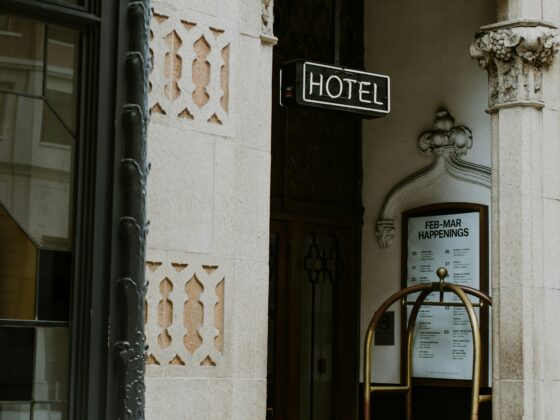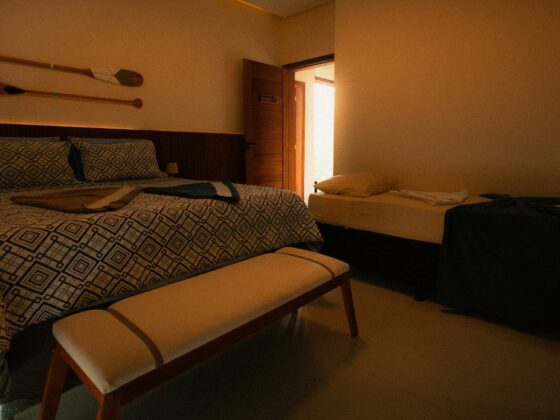
Dayssi Olarte de Kanavos is the co-founder of Women’s Power Series and the Co-Founder, President, and COO of Flag Luxury Group.
Women are the planners and the decision-makers when it comes to travel.
Research shows that women make 80% of all travel decisions. Women also travel more than men for leisure—over 60% of U.S. and global travelers are female. In a 2024 study of female travelers in the U.S., only 10% said “their partner planned the whole trip.” Yet women are still significantly underrepresented in designing and building the hotels they are booking.
In the nearly three decades since my husband and I founded our real estate development company, which specializes in luxury hotels and residences, I’ve seen the number of women leaders grow in our industry. From 2019 to 2022, women gained ground in hotel investment and development leadership roles, moving from “one woman for every 10 men to one woman for every 7.9 men.”
By 2028, women are expected to control 75% of discretionary spending. Despite recent financial news and economic fluctuations, 83% of U.S. consumers intend to travel for leisure in the next year. But we still have a long way to go. It’s still rare to see hotel construction, development, interior design and architecture teams led by women. To better reflect the population that the hospitality industry serves, there is a huge opportunity for more women to be involved where their voices are needed. Our industry can serve as a case study for others, showing why it matters to have more women leaders across all sectors.
Here are three key reasons why increasing the percentage of women in leadership roles can benefit both brands and customers.
Meeting Your Company’s Goals
In the hotel business, your ultimate goal is to satisfy your customers. You want to provide an experience that they value—and they will pay you more for over your competitors. How do you achieve and measure this satisfaction? How can you market to your customers in ways that resonate with them?
The real proof is in your reservations. If more people are coming to your hotel and leaving singing your praises, you’re effectively capturing the market. And when customer satisfaction is high, all of your other metrics are more likely to follow: better ROI, ratings and reputation markers for all of the players. If you’re an interior designer, the evidence may be in your awards and accolades. If you’re an architect, it may be in how many new jobs you land. If you’re an owner, it may be in overall brand elevation.
This lesson about customer satisfaction applies to leaders in other industries as well. If you’re a CEO, you might receive more qualified job applicants who align with your company culture. If you’re a startup founder, you might attract greater investor interest at each stage of funding.
Aligning With Customer Priorities
Many design and architecture firms are still led by men, but some of the best boutique hotels in the space right now—those that are winning readers’ choice awards and are highly competitive in the market—were envisioned by women.
Women bring a unique point of view to the hotel experiences they create. They intuitively understand their customers because they want the same things. They want to get excited about a space and imagine themselves in it, cultivating a deep understanding of how the space appears and functions to a like-minded guest. The look, feel and vibe are critical to creating an elevated experience.
On the team I lead, my senior project manager and many of my top consultants are women, and I found that we are all very much in sync on what makes a space exciting and welcoming and what doesn’t. We invest a lot of our time into how we want each space to be used and what its energy should be, especially in hotel lobbies and bars.
While designing spaces, my team and I put ourselves in the shoes of our guests. We ask questions such as: Is this a place I want to sit? Do I want to have my margarita or cappuccino at this bar? Am I going to put my feet up and relax here? Do the visuals and the music make me want to stick around?
The experience starts from the moment a guest walks through the door. Guests should be able to check in and enjoy themselves as quickly as possible.
Plugging In To The Next Generation
Women who have children are tapped into what the next generation of hotel customers is looking for. When our team was building a new hotel in New York City, it made a big difference to get input from my own three young adults. They grew up in the hospitality business and are also the type of customer we’re targeting.
For the younger generation of travelers, we learned that the vibe of the hotel is paramount. They enjoy aspirational luxury and elevated experiences, but not in a stuffy way. They’d usually prefer a more casual but fun atmosphere over a formal, white-tablecloth restaurant, for example.
We knew that it was crucial to create open, communal spaces where guests can work and socialize outside their rooms. A great bar scene is important, but this idea expands beyond traditional bars into libraries, lounges and multipurpose meeting places with a comfortable environment and access to connectivity. Businesses in all industries need to prioritize the factors most important to younger customers—whether you are designing a beauty product’s packaging, an app’s user interface or a clothing line’s ESG impact.
Sharing Experiences
Women love to share their positive experiences in hotels—and not just influencers with huge followings. They’re not on social media as a business. They’re sharing photos with their 90 Instagram followers or text chains with their closest friends. The best hotels aren’t necessarily the most luxurious, but they offer unique services and experiences that guests fall in love with. And women excel at creating these special moments for other women.
I know one female hotelier who envisioned a hotel that she wanted to stay in. She saw it as an extension of herself. She wanted to personally welcome every guest, saying through her choices: This is my taste. These are the restaurants I want to eat in, and these are the experiences I want to have.
There simply aren’t enough women leading hotel design and construction projects, and I’m committed to changing this. Expanding the number of female leaders will not only empower women in the industry; it will also positively shape the experience of today’s hotel guests and inspire new generations of travelers.
Forbes Business Council is the foremost growth and networking organization for business owners and leaders. Do I qualify?






